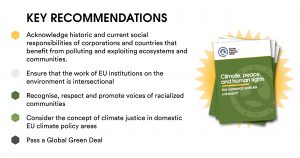QCEA PEACE PROGRAMME
Climate, peace, and human rights
The report Climate, Peace and Human Rights: Are European Policies Coherent? explores the interconnections between climate, peace, and human rights, calling for any green transition to be based on climate justice, by putting people and not profit at the centre. This report is rooted in the Quaker approaches to climate and security, promoting the Quaker concept of the ‘right relationship’. It follows the Quaker view that none of us are truly safe – whether from climate crisis or violent conflict – until we all are.
The climate crisis is higher on the EU agenda than ever before. The report provides an overview of the EU climate policies and initiatives and most particularly the EU Green Deal. The EU has committed to spending 30% of it’s multiannual financial framework (MFF) for the period 2021-2027 on climate action. In December 2019, the EU launched the EU Green Deal (EUGD) with the goal of regional transformation to meet the climate crisis.
EU climate policies cover a wide range of different issues from agriculture to trade or the military, analysed in the report. Yet the report highlights that there is a lack of coherence between these different policy areas and the EU stances on peace and human rights. For example, the EU also continues to invest in carbon-intensive activities such as the arms trade.
The report stresses that any green transition plan must also address sustainability and justice issues, and makes a series of recommendations to deal with these issues, calling for an integrated approach to climate, peace, and human rights. Recommendations include the adoption of a Global Green New Deal, the inclusion of climate justice in all EU policies, an intersectional approach to the environment, centering and promoting the most impacted and the recognition of colonial legacy and structural racism, and the promotion of equality and social justice.
Resources
Quaker organisations working on sustainability and climate issues
American Friends Service Committee (AFSC)
Canadian Friends Service Committee – Climate Change
Earth Quaker Action Team
Friends World Committee for Consultation (FWCC) – Sustainability
Living Witness – Quakers for Sustainability
Quaker Earthcare Witness
Roots of Resistance
QPSW – Climate and Economic Justice
QUNO– Human Impacts of Climate Change
QUNO – Sustainable & Just Economic Systems






